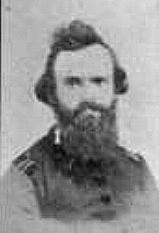Chaplain Jerome Spillman
The Regiment's First Chaplain


Jerome Spillman was born in Tennessee and officially a resident of Indiana, but was serving the church in Nebraska when the war broke out. On February 9, 1862, he was appointed to serve as the chaplain of the Fifth Iowa Cavalry.
A decade before the War Between the States, Spillman had been dispatched by the Methodist Episcopal Church to assist with the congregations on the border in Nebraska. In 1857, he was appointed to take charge of a Methodist "class" which had formed in Fremont. The following letter of introduction was sent to the group's leaders by the Presiding Elder of North Bend, and Fontenelle Missions, of the Kansas and Nebraska Conference:
E. H. ROGERS, ESQ.
Dear Brother: This will introduce to you Rev. Jerome Spillman. I have employed him on the Fontenelle and North Bend Missions. He is a young man, as you will see; still he is full of fire and will do you good service. He is now just from the Indiana Asbury University (of the junior class), is a good scholar, and will prosecute his studies until he graduates. Board him if you can. I will be out on the 11th day of July. Kind regards to yourself and family. Yours truly, J. M. CHIVINGTON.
The History of Nebraska Methodism describes his arrival in Nebraska in this manner:
This is the first appearance of this flaming evangelist in Nebraska. He was born and converted and educated in Indiana. [Note: the regimental roster cites his birth state as Tennessee.] Indiana Methodism at that time, as it had ever been, was of the most aggressive type, and was led by men who were giants in intellectual stature and full of the Holy Ghost, mighty in word and deed. Among these Jerome Spillman received his first inspiration, and imbibed his ideals of Methodism "as Christianity in earnest." He was pursuing the course of study at old "Asbury," under the great Dr. Cyrus Nutt, who was then president. After a few years of college life, and before graduation, he heard the call for men to plant Methodism in Nebraska, and reported to J. M. Chivington for work.
Spillman served other calls, but was especially praised as an evangelist. "In 1859, Jerome Spillman, that flaming evangelist, whose labors were everywhere attended with great revivals, fresh from his victories at Fontenelle, was assigned to Bellevue. There was a great revival and the membership which had been reported at the Conference of 1858 as ten, and in 1859 as nine, was reported at the end of Jerome Spillman's first year to be sixty-two…"
One noteworthy listener made this observation: "Of Spillman's preaching, Judge A. N. Ferguson, of Omaha, son of Judge Fenner Ferguson, the first chief justice of the Territory, has this to say: 'I was but a boy of sixteen at that time, but I often heard Spillman during that great revival and at other times, and no preacher that I have heard in Nebraska has impressed me more profoundly than did Jerome Spillman.' His powerful preaching and great revivals were still matters often referred to when the writer came to Nebraska in 1865. He went into the service of his country early in the Civil War, as chaplain, Plattsmouth and Oreapolis being his last charge in Nebraska, to which he was appointed in 1861. After the war he remained in the South.
Spillman was one of the many clergy who answered the call to serve along side their neighbors. Unfortunately, his service lasted less than one half of a year. He resigned his commission as a chaplain on August 2, 1862 while the regiment was stationed at Fort Henry, Tennessee.
Now an even more interesting event occurred. Spillman's home state of Indiana was raising its 93rd Regiment of Volunteer Infantry. And this regiment was in need of experienced officers… even officers who had not formerly been direct combatants. Thus, Spillman resigned to accept a commission as a line officer, becoming captain of Company G of that regiment. In this capacity, he served for the duration of the war. This "fiery evangelist" became a burning warrior for the preservation of the Union. He fought alongside his old regiment during the Battle of Nashville, and participated in the capture of Mobile. He was wounded in the Battle of Jackson.
After the war he returned to the ministry, this time in the South.. He served a variety of calls, including one term as presiding elder of the Atlanta District. He died November 30, 1899.

Return to the Fifth Iowa Cavalry Personnel
Return to the History of the Fifth Iowa Cavalry